The IFBB has created a new points system to promote increased competition among its athletes while providing fans with consistently-stacked lineups. The announcement of the Olympia Qualification Series came on March 14, 2012, and was largely viewed by fans, competitors and administrators as a welcome change. It's an opportunity for more athletes to compete against the best, ensuring a steady supply of heated battles and exciting events.
The Olympia Qualification Series awards points to competitors who place in the top 5 in all six divisions of all Pro League events. The winners of each Pro League event qualify for that season's Olympia. Each athlete who places in the top-5 at the Olympia automatically qualifies for the next Olympia.
Athletes on the top-tier fringes must, under the new system, fight it out to achieve the score needed to enter the top-5 standings based on accumulated points. If contenders accumulate enough points, they will proceed to Olympia contention.
Olympia Dreams
The IFBB ranked each of its Pro League events from Tier 1 through Tier 4. It will reward athletes with points commensurate with the level of competition each show likely presents (see table below). Such rankings should encourage more athletes to compete in the larger shows and also promote greater overall inclusion in the 'smaller' events (a promoter's dream come true).
Based on current pro point standings, Ben Pakulski has the most points (10) so far and is well-placed for Olympia inclusion. By contrast, Australia's Luke Timms who placed fifth in this year's Australian Pro Grand Prix and 13th at the 2012 Mr. Europe Grand Prix, has secured only one point. In order to make it to the Olympia, he needs to overtake men like Tony Freeman (4 points), Sergey Shelestov (4 points) and Flex Lewis (3 points).
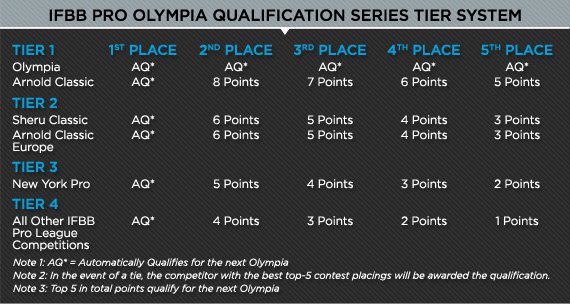
Pros and Cons of Systemic Change
As with any new system or set of rules governing the running of sporting events, it remains to be seen whether the latest IFBB mandate is as successful as proposed. It seems well-thought-out and has been welcomed as a way to generate mainstream interest and opportunities for sponsorships for fitness, figure and bodybuilding competitors. But there aren't many systems that are infallible, and it's still worthwhile to assess the pros and cons of this new regulation.
Pros
Bigger Lineups: With Olympia inclusion at stake, more athletes will vie for top honors in a greater number of IFBB-run pro events. More participation in better events will serve to promote pro bodybuilding's elite athletes on a much grander scale and increase the sport's level of exposure.
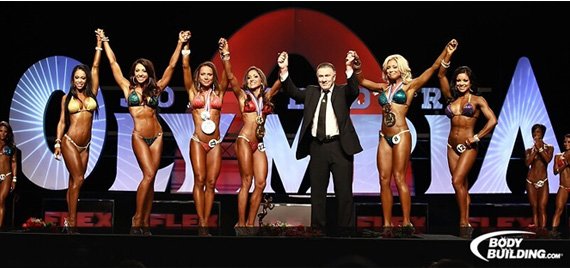
Olympia Inclusion: The system rewards athletes who are willing to make the necessary sacrifices and who have the toughness and resiliency to stand toe-to-toe with the world's best for months on end. The Olympia is on the line all year now. Lesser competitors who consistently maintain their peaks can earn points and overtake the betting favorites. This will help keep competitors honest and will likely raise the physical standard among all IFBB pros.
Better-Conditioned Athletes: The new qualification system may encourage athletes to fine tune their preparation and consistently bring their A-game to each contest. IFBB athletes will have to perfect the art shredding and peaking in order to obtain those much-needed points. Competitors may initially find it difficult to adjust to the pressure of competing more often, which may be reflected in the way they look onstage. But in due course, we should see a much higher standard. More competitors will then be likely to take to the Olympia stage in the best shape of their lives.
Star Athletes Will Compete More Often: Though the sport's biggest names may have already received automatic Olympia inclusion, contenders who routinely place in the top 5 in the smaller shows may now be forced to compete more often. If this does occur, each show's lineup may be on par with the average Arnold Classic or New York Pro field, leading to bigger and better contests. 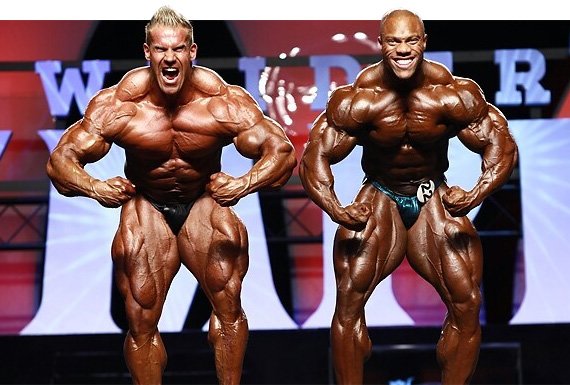
Increased Mainstream Interest: Because more top-level competitors will challenge each other more often, the IFBB (and bodybuilding in general) will likely gain greater exposure. Events will be more widely discussed and disseminated, and we can expect more anticipation for upcoming shows. This extra exposure will naturally translate to more mainstream interest in pro bodybuilding, a win-win for the sport.
Tests The Best: In sports, top amateur events like the Olympics and professional leagues (NFL and MLB), athletes are expected to compete week after week to solidify their position as the best of the best. Pro bodybuilding organizations once tested their athletes under such trying conditions. The Grand Prix tours of the '70s, '80s and '90s were much more difficult than they are now.
A major component to athletics is the ability to consistently perform at the highest level. Until recently, certain professional bodybuilders—usually elite level competitors—may have competed only once per year; then they trained, rested and put the rest of their energy into showing well at the Olympia. They relied on their genetic gifts and previous placements, not the work ethic that distinguishes a champion from an also-ran. Now the top contenders, like all other athletes, may have to prove themselves many times each year.
Cons
Back-To-Back Competition: In the past, IFBB pro athletes would have the opportunity to pick an event, train hard for it, then land in the top 3 to garner Olympia inclusion. In the new system, athletes unlikely to either win an event or place top 5 in the Olympia will be pressured to gather the necessary points instead. It is difficult to prepare for just one event, but having to compete several times over 3-to-4 months could prove exhaustive. A weary schedule could result in a lineup of battle-weary Olympians.
Potential Danger: For those who must compete many times throughout the year, multiple peaking could mean an increased reliance on potentially harmful chemicals like clenbuterol, diuretics and other enhancers. The demise of champions Andreas Munzer and Momo Benaziza, both known for their active pro competition schedules, shows that tipping the body's chemical balance too far can have devastating consequences. Seasoned competitors know that in today's ultra-competitive pro bodybuilding scene, it is imperative to achieve off-the-charts-conditioning to have any hope of finishing well.
New Pros May Struggle: While the new qualification system may enable new pros to gain Olympia inclusion based on persistence of effort and extreme sacrifice, many rookie competitors may not yet have the experience needed to nail their conditioning for one event, let alone many competitions in succession. They will have to adjust, overcome, and learn from their mistakes. Such a practice may prove dissuasive, thus forcing many promising athletes out of the sport before they're truly in.
Champions and Insiders Speak
Professional competitors weigh in on the new Olympia Qualification Series:
IFBB Pro Bodybuilding Legend

Most pro bodybuilders who compete today may like the idea of getting points to participate at the Mr. Olympia competition, but some athletes may not have the Olympia-level physique to successfully compete. Most qualified athletes should have a serious year of preparation to significantly progress in order to reach Olympia level. The current level of muscle development, density and conditioning required to compete against the best Olympians is phenomenal, and with no comparison to any other professional competition, it's difficult to judge how far an athlete has come. We will only know for sure the positive or negative side of this qualification system after trying and verifying it.
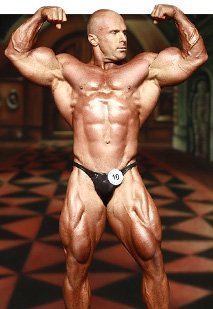
IFBB Pro Bodybuilder
I was pretty accustomed to placing top 3 and top 5 under the NY pro qualifying system when aiming for Olympia inclusion. I had that set in my mind for some time and felt I was almost there because I have placed 9th, 7th and 5th. I am not sure if the new system is better for us or not. I guess I must take it up a notch and win a show or be more consistent with my competing. Either way, I now have to become a better bodybuilder. The Mr. Olympia is a prestigious event and I am glad they are making us work hard to qualify for it. If they didn't and some guys slipped in and qualified because there was lack of competition in a qualifying show, then it would no longer be special. Why would you want to walk on that stage with the best in the world if you looked out of place up there?
IFBB Pro Bodybuilder
I think the point system is valid. It will benefit contest promoters who may otherwise lose competitors when a "big name" athlete commits to their show. It also provides an opportunity for athletes who may never win an IFBB pro contest to gain an Olympia qualification. The downside is that some competitors will essentially need to diet year-round and enter several contests to gain a qualifying spot. Getting to the Olympia stage will be like running a marathon and on the day of the Super Bowl of bodybuilding, those who competed often will not be able to bring their best physique to the stage.
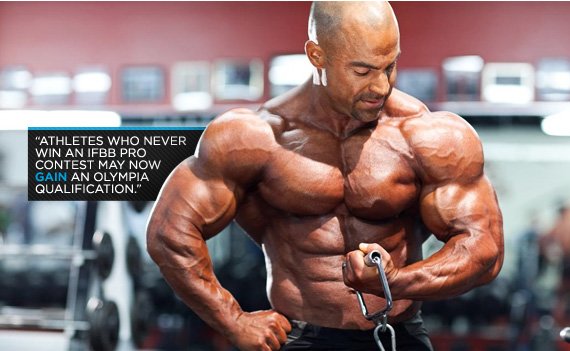
Writer, Book Author, Physical Transformation Specialist
The new IFBB Pro League points scoring system is definitely a welcome addition for all parties: fans, promoters, athletes and for worldwide exposure of the sport. Of course, more fans will be encouraged to visit more events knowing they are going to see a stacked lineup of top-tier bodybuilders fighting to accumulate as many points as possible for Olympia qualification. Bodybuilders will stay in shape more, which will be attractive for photographers, promoters, and sponsors. And overseas promoters are likely to see more names and numbers enter their events.
I am glad that bodybuilding is starting to acknowledge and recognize what works in other successful sports. You don't see pro tennis players or cyclists enter 1-2 events per year, so why should bodybuilders be given a different privilege? I understand all too well that dieting and competing is very taxing, but guys like Vince Taylor, Levrone, and Gaspari used to compete frequently through the year. This is what being professional is about.
IFBB Pro Bodybuilder
I really like the system, because athletes who compete more frequently should be rewarded for their efforts. I don't compete that often because my muscles still need to mature and grow and I still need a good offseason, but I totally agree with the fact that athletes who are competing more frequently represent the sport in a good way and should have the opportunity to reach the Olympia stage through their consistent effort.
IFBB Pro Bodybuilder
I'm struggling to embrace the new point system. The logic behind what the organization is attempting to do for the sport appears to be one that provides a solution for competitors, promoters and fans. However, the new point system can be a disadvantage for those competitors who decide to wait for only a 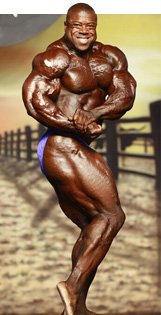 select few shows or for those who cannot afford to compete as often without the aid of sponsorship. This would immediately eliminate the possibility for some competitors who are attempting to qualify for the Olympia. Their lack of competing limits their ability to obtain the amount of points needed for qualification. So if you didn't get a head start at the beginning of the competition season, you're pretty much out of luck.
select few shows or for those who cannot afford to compete as often without the aid of sponsorship. This would immediately eliminate the possibility for some competitors who are attempting to qualify for the Olympia. Their lack of competing limits their ability to obtain the amount of points needed for qualification. So if you didn't get a head start at the beginning of the competition season, you're pretty much out of luck.
From a top-tier competitor viewpoint, the new system will have a minimal impact. But, it's somewhat prejudicial to the remainder of the competitors. But on the other hand, if there is a positive outcome to this sudden change it won't be seen until the next season. With the options provided on how to obtain a qualification for the Olympia, it obligates more of the top competitors to participate at local shows. This should fill more shows for the promoters, providing profitability, and it will allow fans to see their favorite competitor battle it out prior to seeing them on the big stage. We will know the effects of this system in due time.
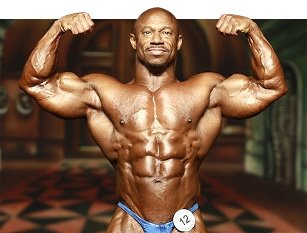 IFBB Pro
IFBB ProI am a creature of habit, so unfortunately I am not a big fan of the change. It's hard to be strategic as an athlete as to what show to do if the only two ways into the Olympia is a 1st place win and accumulation of points. In other words, it seems easier to pick a show where you might place top 3, then focus on the Olympia, than doing 4-to-5 shows for the sake of accumulating enough points to qualify. In addition, how can a person even have a decent attempt in the Olympia after 4, 5, 6 or however many shows you need to get there? We know our sport—the body needs some rest—but you could see how this could put some tired bodies on stage. As with many changes that occur in any sport, only time will tell. I think the powers that be do a great job making rule adjustments when a system does not meet its expectations.
IFBB Pro Bodybuilder
The new Olympia qualification system will definitely help determine the best of the best in all the categories. I think we will see its results, in full effect, after this year's Olympia.
Ph.D. Nutritional Sciences; Bodybuilding Author
I think the new Olympia points system has upsides and downsides. I think the downside is that many competitors will compete year-round and not make as many improvements as they otherwise might, due to constant dieting for numerous competitions. On the plus side, it gives competitors a reward for doing so many shows and also ensures that people who consistently place high get a shot at the Olympia. Also it ensures that more high-quality competitors will compete in more shows other than just the Olympia and Arnold. Overall, I like the new rule.
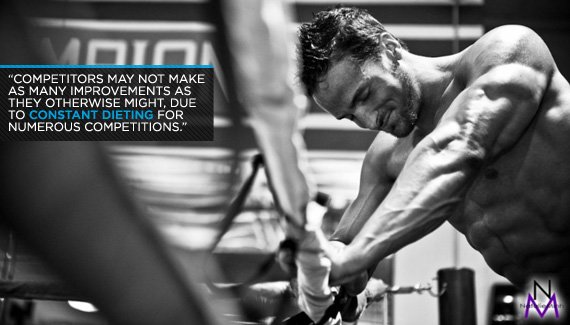
Author, Bodybuilding: Tracing the Evolution of the Ultimate Physique
Given the current state of professional competition, anything that encourages bodybuilders to compete more often also encourages them to take more appearance-enhancing drugs and to flirt more often with dehydration-related calamities. Let's not forget that Mohammed Benaziza dropped dead only hours after stepping offstage at the last of the 1992 European Grand Prix contests, or that Andreas Munzer died only days after the San Jose Pro show in 1996. Both competed as often as the IFBB schedule allowed.

It could be argued that the new qualification system will give more bodybuilders the opportunity to compete in the Mr. Olympia contest. A counterargument holds that if you weren't good enough to qualify under the old system, you probably don't belong on an Olympia stage anyway. Nevertheless, competing in an Olympia, even if it means getting one's butt kicked, may be the lifelong dream of many also-ran professionals. It may appear that the IFBB has changed the rules as a charitable gesture, but it's also worth pointing out that such gestures are out of character for that organization. This may appear to be a cynical point of view, but the history of the IFBB and bodybuilding in general invites this attitude.
So why is the IFBB changing the qualification rules? In a situation like this, it may seem appropriate to conjure the old adage which says if you ask 100 questions, 99 times the correct answer is the same: Money. Will the IFBB generate more money from this, and if so, how? Or a better question might be how will it funnel more money into the hands of the right people? One can only guess if money is indeed the underlying motivation. Meanwhile, pro bodybuilding, a stressful occupation for those who depend on it to make a living, may have just gotten more stressful.
Bodybuilding Media Producer and Host
The system was created in an effort to encourage athletes to compete more often. It also ensures a higher-caliber lineup. Under the old system, an athlete would qualify for the Olympia simply by finishing 3rd at a single event. Those days are over. The new system is a step in the right direction.
Bodybuilding MC and Writer

I think the new qualifying standards cut both ways: yes, it does get competitors - not the top tier guys - to probably compete in more contests, helping out promoters, but it may not result in having the best of the best on the Olympia stage. The Arnold Classic is by invitation only, so the field can be limited to 12-14 guys, or how many Jim Lorimer decides he wants. With the new Olympia standards, it's virtually impossible to present that size of a lineup. I imagine that's what the Olympia production people are hoping for.
What happens if there is a tie between 3-or-4 guys for the last slot? The top 5 at the Olympia automatically re-qualify for the following year, as do the top 3 do likewise at the Arnold and the top 2 at the New York Pro. That's nine guys already. So many shows naturally water down many of the line-ups. It won't be an easy task making the Olympia a contest where only the Grade-A physique artists take the stage.
Note: in the event of a tie, the best top-5 placements will proceed to the Olympia.
IFBB Pro Bodybuilder
I liked the old rules. The new ones seem to look good too, but it's a lot more difficult due to the strain of competing in multiple shows per year. I believe the new rules have deterred a lot of pros from entering if they know first place is already taken. If some pros skip out, we may see smaller lineups. 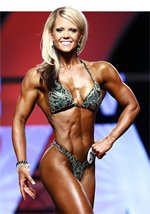
IFBB Pro Figure Competitor
I think this system is good for a few reasons:
- It will allow only the best of the best to attend the Olympia instead of upward of 30 competitors in each category.
- It will get competitors competing more throughout the year instead of just once before taking the rest of the year off.
- It is great for promoters to keep big names in their shows and bring in more money.
